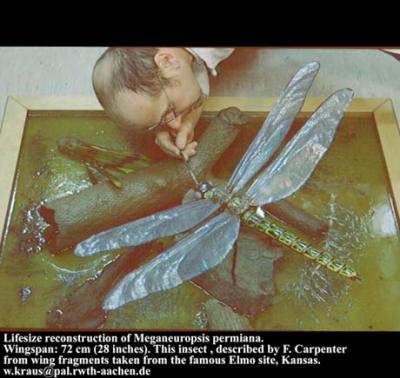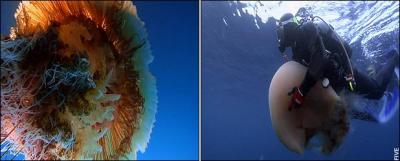Evolution is a pretty interesting thing. Driven by natural selection organisms that are best adapted to their environment thrive while others die off. It is an elegant, albeit brutal process. Nature doesn’t care if some particular plant has the cure for AIDS, if that plant can’t adapt to a new (global warming induced) climate it will die out. This is just as true for people as it is for plants.
Natural selection doesn’t care if the climate changes because of a volcano eruption, or the burning of fossil fuels. The rules are the same, those that adapt live, those that don’t bye bye. The climate of this planet has changed many times over the eons. Sometimes because of the shifting of landmass’ sometimes because of certain creatures (early oxygen producing bacteria created an environment more conducive to oxygen breathing life).
In fact our biological history is rife with examples of certain living things on the planet changing the entire ecosystem of the planet. During the carboniferous period, there were so many swampy plants pumping out so much oxygen that eventually the atmosphere became one big excuse for a firestorm, the high oxygen content of the air also allowed for amazing super sized insects (insects breath through there skin, meaning that they can only get so big before the oxygen can’t make it all the way to the center, more oxygen = bigger bugs). It was during this period that a lot of the coal and oil that we burn today started it’s life as rotting plant matter.
We are now unlocking millions of years of stored carbon, and pumping it back into the atmosphere. We are also flushing billions of gallons of nutrient rich water (nitrogen, phosphorus, sewage, fertilizer from farms, factory waste) into the oceans. This is literally changing the chemical makeup up the planets atmosphere and oceans. Carbon interacts with sea water to produce a weak acid. These changes have been changing the very climate of the oceans, making it harder for creatures that have adapted to a less acidic and less nutrient filled oceans to survive. Things that used to rule the world, horrible things, have returned, and they don’t like us.
The fireweed began each spring as tufts of hairy growth and spread across the seafloor fast enough to cover a football field in an hour.
When fishermen touched it, their skin broke out in searing welts. Their lips blistered and peeled. Their eyes burned and swelled shut. Water that splashed from their nets spread the inflammation to their legs and torsos.
“It comes up like little boils,” said Randolph Van Dyk, a fisherman whose powerful legs are pocked with scars. “At nighttime, you can feel them burning. I tried everything to get rid of them. Nothing worked.”
As the weed blanketed miles of the bay over the last decade, it stained fishing nets a dark purple and left them coated with a powdery residue. When fishermen tried to shake it off the webbing, their throats constricted and they gasped for air.
After one man bit a fishing line in two, his mouth and tongue swelled so badly that he couldn’t eat solid food for a week. Others made an even more painful mistake, neglecting to wash the residue from their hands before relieving themselves over the sides of their boats.
For a time, embarrassment kept them from talking publicly about their condition. When they finally did speak up, authorities dismissed their complaints — until a bucket of the hairy weed made it to the University of Queensland’s marine botany lab.
Samples placed in a drying oven gave off fumes so strong that professors and students ran out of the building and into the street, choking and coughing.
Scientist Judith O’Neil put a tiny sample under a microscope and peered at the long black filaments. Consulting a botanical reference, she identified the weed as a strain of cyanobacteria, an ancestor of modern-day bacteria and algae that flourished 2.7 billion years ago.
O’Neil, a biological oceanographer, was familiar with these ancient life forms, but had never seen this particular kind before. What was it doing in Moreton Bay? Why was it so toxic? Why was it growing so fast?(via)
Thats right, we have changed the chemical makeup of the oceans so much that it is now a pleasant breeding ground for ancient bacteria that are adapted to an earlier time. The unfortunate thing is this particular bacteria happens to have a very very bad attitude.
The venomous weed, known to scientists as Lyngbya majuscula, has appeared in at least a dozen other places around the globe. It is one of many symptoms of a virulent pox on the world’s oceans.
In many places — the atolls of the Pacific, the shrimp beds of the Eastern Seaboard, the fiords of Norway — some of the most advanced forms of ocean life are struggling to survive while the most primitive are thriving and spreading. Fish, corals and marine mammals are dying while algae, bacteria and jellyfish are growing unchecked. Where this pattern is most pronounced, scientists evoke a scenario of evolution running in reverse, returning to the primeval seas of hundreds of millions of years ago.
Jeremy B.C. Jackson, a marine ecologist and paleontologist at the Scripps Institution of Oceanography in La Jolla, says we are witnessing “the rise of slime.”
This is kind of a problem as a large part of the world harvests it’s primary source of protein from the sea. And in case you were wondering this problem is not restricted to one part of the world.
The consequences are evident worldwide.
Off the coast of Sweden each summer, blooms of cyanobacteria turn the Baltic Sea into a stinking, yellow-brown slush that locals call “rhubarb soup.” Dead fish bob in the surf. If people get too close, their eyes burn and they have trouble breathing.
On the southern coast of Maui in the Hawaiian Islands, high tide leaves piles of green-brown algae that smell so foul condominium owners have hired a tractor driver to scrape them off the beach every morning.
On Florida’s Gulf Coast, residents complain that harmful algae blooms have become bigger, more frequent and longer-lasting. Toxins from these red tides have killed hundreds of sea mammals and caused emergency rooms to fill up with coastal residents suffering respiratory distress.
North of Venice, Italy, a sticky mixture of algae and bacteria collects on the Adriatic Sea in spring and summer. This white mucus washes ashore, fouling beaches, or congeals into submerged blobs, some bigger than a person.
Along the Spanish coast, jellyfish swarm so thick that nets are strung to protect swimmers from their sting.
Speaking of jellyfish, they are uniquely adapted to a global warming world. They thrive on the nutrient rich runoff from factories, farms, and human sewage from giant cities. They also don’t seem to be bothered by the higher acid content from co2 in the air. One particularly nasty species is the Box Jellyfish. It is so loaded with toxins that it can kill a full grown man in seconds.
Not only that but if you fuck with them too much they go into a breeding frenzy which causes millions of replacements to plague you. Ever see the movie aliens, well shudder in fear for nature has wrought something worse, the Box Jellyfish. Not only that but they seem to be replacing more complicated organisms in the ocean with a speed that scares everyone who knows about it. Japanese salmon fishermen will often haul in nets full of Box Jellyfish instead of salmon. Scientists managed to place tracking devices on the massive things and found that they don’t just drift about, they are moving with a deliberate pace, at the speed of an Olympic swimmer towards Japan. Surfs up dude.
An attempt by the Japanese government to protect their fish stocks by wiping out the swarms using a fleet of commandeered fishing boats to drag razor-sharp wire through them backfired spectacularly.
Scientists discovered captured big female box jellyfish were swollen with millions of eggs – far more than they would normally carry. Similarly males were carrying billions of sperm. Trying to kill them had unleashed a breeding explosion because they are genetically programmed to ensure their survival by producing more offspring than normal when under attack.(via)
The jellyfish have a formidable array of genetic equipment to help them survive:
- A highly complex sensory capacity and the ability to distinguish color.
- The ability to live in inhospitable waters at a depth of up to 10,900 meters.
- A total of 24 eyes with movable pupils giving them 360-degree visibility.
- Box jellyfish have 6-8ft long tentacles. Just 5-6ft across the body is enough to kill a human in 180 seconds.
- Venom is released on contact – even after it is dead – and each creature has 4000,000,000 venomous fibers.
- Humans who have been stung and survived have needed 30-40 milligrams of morphine. A broken leg requires between 5-10 milligrams.
- Despite decades of study scientists have been unable to unravel the mysteries of its complex venom but it is known to contain 20 different proteins.
Mother nature is clearly nothing to fuck with. Natural selection is a brutal unforgiving process, things like the Box Jellyfish and the Fireweed cynobacteria are survivors. They have adapted to be the meanest nastiest things on the block. They don’t care if you need to fish to feed your family, and the certainly don’t care if you want to go swimming. Considering the billions of people world wide who make their livelihood from the sea, it might be a good time to take note of the things we are flushing into the worlds oceans, and pumping into the worlds air.
There will come a time when even human beings amazing adaptive nature will be taxed by changes in the environment. Natural selection works on us as well, when faced with a rapidly changing climate we have two choices, adapt or die. Lucky for us, nature has provided us with the ability to plan, that big brain in our heads (the human brain to size ratio is one of the largest in nature) allows us to predict dangers before we encounter them. If we stop our harmful dumping and toxic gas emissions now we wont have to live in a world where Fireweed and Box Jellyfish rule.
Much more here Warning this link leads to some profoundly depressing information. I would go out and do a couple good deeds before viewing it.


Wow, this is interesting =O
If you want to read more about the kick-ass Box Jellyfish, visit the following link:
http://www.moonsheep.co.uk/blog/?p=4
Moon Sheep.